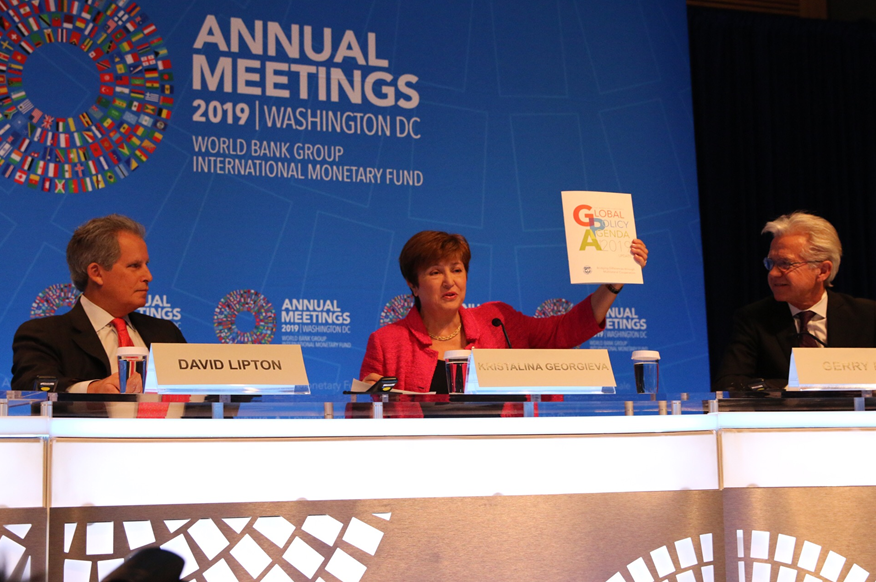IMF chief says Sino-US 'trade peace' needed


China and the United States need to move from a "trade truce" to a "trade peace", International Monetary Fund Managing Director Kristalina Georgieva said Thursday as she called for efforts to ramp up the multilateral trading system amid slowing global economic growth.
In their latest round of talks that concluded in Washington on Oct 11, China and the US achieved "substantial progress" in areas including agriculture, intellectual property rights protection, technology transfers and mechanisms for dispute settlement. The US also suspended a tariff hike on $250 billion in Chinese imports that was set to take effect last Tuesday.
"I was encouraged by last week's announcements from the US and China. Our meetings this week are an opportunity for all parties to make progress in moving from a trade truce to a trade peace," Georgieva told reporters on the sidelines of the annual fall meetings of the IMF and its sister lending institution, the World Bank.
Georgieva, who recently said the cumulative effect of trade conflicts could shave about 0.8 percent from the global GDP, or a loss of around $700 billion by 2020, said she learned from the "very smart economists" at the IMF that "this truce as discussed" could shrink the impact and reduce the loss by 0.2 percent.
"That, of course, is good news but not good enough. What we need is to reach not just a truce. We need to have a trade peace," she said. "We need to go forward to a system that is enhanced and it is enforced, so we can see trade return to its role of an engine of the world economy."
In "Bridging Differences through Multilateral Cooperation: The Managing Director's Global Policy Agenda", a policy paper released on Thursday, Georgieva said escalating trade disputes, entrenched policy uncertainty and adverse geopolitical developments have taken a toll on confidence, investment and growth.
The focus must be on reversing tariff increases and finding lasting solutions to trade disputes, including by removing domestic distortions and strengthening the multilateral trading system, she said in the paper.
"I would stress that it is highly beneficial to bring forward trade, and that also means to candidly assess what is not quite right in today's trade system," she told reporters.
"The trading system we have today has served us well in the economy of the past. It does not quite serve us for the economy of the future, and we need to recognize that we will have to find a way as a world community to be more agile and adaptable in agreements we reach because the world will continue to change," Georgieva said.
The remarks echoed her speech on Oct 8, when she said the world needs a more modern global trading system, particularly to unlock the full potential of services and e-commerce, and every country must do more to help communities harmed by the dislocations associated with technology and trade.
"The key is to improve the system, not abandon it," she said in the speech.
The new IMF chief said she expected to visit China soon and that the global lender would continue to cooperate with China.
"I look forward to visiting China, and I know China has been for 40 years pursuing a pathway to reform. The IMF has been a partner of China in these reforms, and we will continue to do so," Georgieva said on Thursday.
Georgieva is expected to visit China within the coming two months, according to IMF sources.
At another news conference, David Malpass, president of the World Bank Group, said global growth is slowing, investment is sluggish, manufacturing activity is soft and trade is weakening-a backdrop that makes the World Bank's goals of reducing extreme poverty and boosting shared prosperity even harder.
One in 12 people on the planet, or about 700 million people, still live in extreme poverty, Malpass said.
"We need fresh thinking to reignite growth," he said. "Well-designed structural reforms are needed to unlock growth and build the foundations for future prosperity."
Malpass said that it was a "dramatic development" that China pulled huge numbers of people out of poverty, and that the World Bank is evolving toward "new types of interaction" with China.
"The bank, historically, has had a 40-year relationship, or more, with China, in terms of the poverty programs and in terms of the market orientation of the economy," he said. "We continue to have that relationship."




































